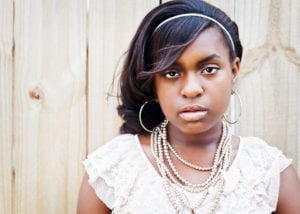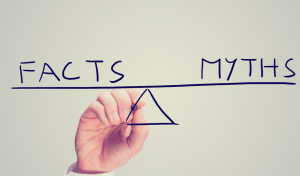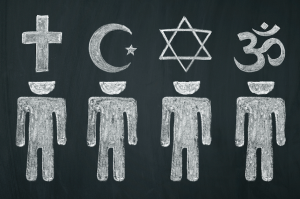
A teenager stares intensely at the viewer.
(Content Warning: suicide)
When I was about thirteen, emo culture was at its peak.
I have both praises and reservations about the effects of emo subculture. On the one hand, it encouraged a great number of teenagers to get real about their feelings. On the other hand, it can glorify unhealthy coping mechanisms and reduce mental illness to an aesthetic.
But the subculture did make me realize an awful truth: Adults have a tendency to dismiss the mental health issues of teenagers.
As someone who was coming to terms with mental illness, it was incredibly difficult to deal with adults who dismissed my struggles or treated me as if I didn’t know what I was feeling. It made it even harder for me to ask for help when I was depressed, suicidal, and dealing with symptoms of PTSD.
In recent years, I’ve learnt a lot about mental health, ableism, and adultism, which has helped me articulate how difficult it is to be a teenager with mental illnesses. While I’m 22 now, I still feel somewhat traumatized by the way my feelings were dismissed years before.
Given that suicide is the second leading cause of death in people aged 10-34 in the US, it’s incredibly important that we recognize that mental illness affects young people, and that we learn to support young mentally ill people.
Let’s look at some of the ways adults dismiss teenagers’ mental health issues – and let’s vow to include young people in fighting mental illness stigma.
1. ‘You’re Just Hormonal’
I used to cry a lot between the ages of ten and fourteen, and I was constantly told that “hormones” were the cause of my perpetual misery.
You don’t need medication, it’s just hormones. You don’t need therapy, it’s just hormones. You don’t need a support network, it’s just hormones.
While people who menstruate often have their mental illnesses dismissed as “PMS,” hormones are similarly blamed for producing the symptoms of mental illness in adolescents.
For sure, fluctuating hormones during puberty can cause someone to struggle with mood swings and emotional management. But knowing it’s “hormones” seldom makes it any easier to manage those feelings. Sometimes, teenagers – and younger children – do need therapy, support, and medication.
Even so, if fluctuating hormones are indeed to blame for someone’s poor mental health, then something needs to be done about it.
For example, if someone’s often deeply depressed before menstruating, they could have pre-menstrual dysmorphic disorder (PMDD). PMDD is a severe form of PMS characterized by extreme mood swings, depression, fatigue, anxiety, and physical pain. A number of friends have described being suicidal because of PMDD – something that can be treated and managed if you receive the correct medical care.
Sometimes emotional difficulties can stem from the fluctuation of hormones associated with puberty and adolescence. Sometimes it’s deeper than that.
Either way, dismissing someone’s emotional state based on “hormones” (real or imagined) is an unhelpful way to go about addressing their difficulties. No matter the cause of the struggle, it needs to be met with support and care.
2. ‘You’re Too Young to Know What Love Is’
My mental illnesses manifested a lot when I was in my first relationship, which was really toxic and unhealthy.
It was around this point where I admitted to myself that I had been sexually assaulted. It was also around this time that I started having panic attacks and became particularly depressed.
When that boyfriend and I broke up – and we broke up and got back together often – my mood often sunk really low. I thought it was lovesickness. But in hindsight, it was depression.
I’m not saying that being heartbroken is the same as having a mental illness. But having certain mental illnesses can certainly make heartbreak even worse. When I tried to describe my feelings around my relationship, I was told I wasn’t really in love because I was too young to know what love was.
As my love was dismissed, so was my heartbreak – and so was the depression.
Firstly, deciding what someone feels – no matter what their age is – is awfully paternalistic and patronizing. Love is a socially-constructed idea, and it can be interpreted in many ways. So telling someone that their love isn’t “real” doesn’t really make sense.
Secondly, whether someone is “truly” in love or not isn’t important in this context. When people struggle with emotions relating to their relationships, we need to listen to those feelings instead of judging them.
I often see younger friends having their relationships dismissed as “puppy love.” Not only is this super condescending, but the concept of an innocent, naïve, “un-real” form of love somewhat implies that their relationships or partners can’t be just as toxic or abusive as with adults.
Dismissing the relationships of teenagers goes along with dismissing their feelings. We need to stop doing both of those things.
3. ‘What Do You Have to Be Depressed About?’
When I was in high school, I spoke to some friends who were in therapy. What struck me was that their parents nearly always responded to their mood disorders by saying, “But what do you have to be depressed about?”
Firstly, that question is often unanswerable. Depression – most forms of mental illness, really – doesn’t have to have an explicit, tangible cause. It just is. And while many factors could make it worse, it’s often hard to pinpoint those factors, especially if you’ve never gone to therapy or used other forms of support.
Secondly, there’s an implication that teenagers in particular don’t have anything to worry about. This implication is severely out of touch with reality.
Teenagers are often financially dependent on their parents. If their parents are toxic, abusive, or just plain difficult, it can be incredibly stressful. They might also be in an oppressive school environment.
And when their youth intersects with other aspects of their identity, it gets even harder.
Queer and trans teenagers are likely to suffer from poor mental health, partially because they’re more likely to be homeless or live in poverty. Teenage girls are common targets for misogyny and sexual violence. Young people of color are often especially victimized by racial profiling and police brutality.
Long story short? Being a teenager isn’t easy.
Beyond that, bluntly asking a teenager what’s causing their depression without acknowledging their feelings is insensitive. You’re asking them to perform their pain.
4. ‘It’s Just a Phase’
Teenagers and children have their interests, dreams, and even their sexual orientation and gender identity dismissed as “phases” all the time.
It’s no different when it comes to mental illness.
I understand why you’d want to tell someone that their pain is “just a phase.” When our loved ones are struggling, we often want to remind them that the situation is only temporary and that it’s possible to feel happiness and calm again.
But often, when we say things are “just a phase,” we dismiss the severity of the situation. We use it as an excuse to ignore the reality.
I’ve been in plenty of situations where my depression did pass, but only once I received a lot of support and worked hard on getting better.
Saying “hold on, it will get better” can sometimes be helpful. Reminding someone that there are brighter days ahead can be really powerful.
But that reminder should be accompanied by real action and support.
***
When it comes to both teenagers and people with mental illnesses, we tend to gaslight them a lot by dismissing their mental health. So when someone is both a teenager and a person with a mental illness, that gaslighting doubles.
I often wonder if my friends and I would have been better off today if we lived in a society that took teenagers’ mental health seriously. While I don’t have an answer to that, I’m certain that we need to keep fighting against ageism and ableism.
After all, it might just change – and save – lives.
[do_widget id=’text-101′]
Sian Ferguson is a Contributing Writer for Everyday Feminism and full-time freelance writer based in South Africa. Her work has been featured on various sites, including Ravishly, MassRoots, Matador Network, and more. She’s particularly interested in writing about queer issues, misogyny, healing after sexual trauma and rape culture. You can follow her on Twitter and Instagram. Read her articles here.
Search our 3000+ articles!
Read our articles about:
Our online racial justice training
Used by hundreds of universities, non-profits, and businesses.
Click to learn more




















